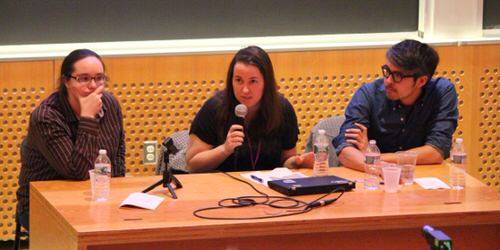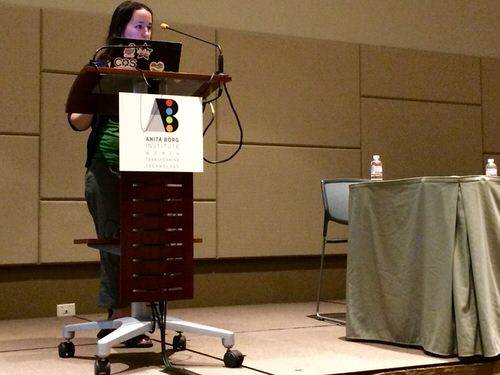
Say you’re a software developer and you want to give back to an open-source project you’ve relied on yourself. Or perhaps you just want to build up experience in open source because, well, open-source projects are the future.
See also: Software May Be Eating The World, But Open Source Is Eating Itself
But you’re hesitant because open source communities can be unfriendly—sometimes even intimidating—to newcomers and outsiders. That might be especially true for women and people of color, who appear to be woefully underrepresented in open source. How are you supposed to get started?
Fear not. Shauna Gordon-McKeon has your back.
Don’t Put Up With Any Crap

Gordon-McKeon is program director at OpenHatch, a nonprofit group dedicated to open source education. She regularly visits universities and technology conferences geared towards women to promote more female participation in open source software.
And her first piece of advice for the uncertain is simple: Don’t stick around if the first project you try isn’t welcoming.
“You don’t have to settle for the places that are toxic,” Gordon-McKeon told me in an interview at the Grace Hopper Celebration of Women in Computing in Phoenix this week. “Part of being comfortable in the space is being confident.”
There’s plenty to worry about on that score. The open source community has a reputation for being rough-and-tumble—and that’s putting it politely—as well as downright unfriendly to women. Perhaps it’s not surprising that just 11% of open source contributors are female, according to a 2013 study.
See also: Open Source Is Way Whiter And Maler Than Proprietary Software
Earlier this week, RedHat software engineer and longtime GNOME project contributor Lennart Poettering openly criticized the toxicity of the open source community, saying that it’s “full of assholes” and “a sick place to be in.” He wrote:
The Linux community is dominated by western, white, straight, males in their 30s and 40s these days. I perfectly fit in that pattern, and the rubbish they pour over me is awful. I can only imagine that it is much worse for members of minorities, or people from different cultural backgrounds, in particular ones where losing face is a major issue.
This list of harassment and sexist incidents in various open-source communities (search on or scroll down to “Incidents”) underscores Poettering’s point.
Gordon-McKeon and OpenHatch, however, insist that the answer isn’t to just give up on open source—a nonstarter in any event, given its increasing prominence in most fields of computing. Instead, they argue that open-source newcomers can do themselves a lot of good by opening up lines of communication with the communities they’d like to work with.
Don’t Think Open Source Is Just About Code
“I strongly encourage you to not think of [open source as] a monolithic community, but think about what your particular interests are,” Gordon-McKeon said at her Grace Hopper presentation, “How to Contribute to Open Source,” which she delivered on Wednesday. “Open source isn’t just for programmers.”
Beyond programmers, many projects need designers and people in support roles such as social media managers, Gordon-McKeon said. Those are roles people might not know about unless they ask people already working on the project to describe the needs of a specific project.
Chat With Other Contributors
Which leads directly to Gordon-McKeon’s third point. “Before you do anything, touch base with the community first, and say ‘I want to contribute to your project’,” she said.
IRC channels, or Internet Relay Chat chat rooms that projects regularly use for project management and talking with contributors, are a good way to introduce yourself and talk to people working on a particular project.
Additionally, Gordon-McKeon suggests reading through all the “issue trackers” that organize and prioritize a project’s current to-do tasks. That’s not just a good way of bringing yourself up to speed on the projects biggest needs, it can also help you figure out exactly where you might like to contribute. At the very least, it gives you something to talk to other project members about.
Remember: It’s Okay To Be New
It’s easy for beginners to feel overwhelmed after joining an open-source project. Gordon-McKeon says not to get discouraged.
“If you go to an issue tracker and things seem confusing, it’s not just you,” she said. “These tools require a lot of implicit knowledge, but people can help you navigate it and you can ask them questions.”
Most communication takes place asynchronously, at different times and in different parts of the world. You shouldn’t expect immediate responses. Be patient with other contributors, Gordon-McKeon said, and don’t be afraid to follow up if no one responds to your query.
Go Where You Feel Most Comfortable
In most open-source communities, it’s okay to ask for help and provide answers to other community members, even if you’re new to the project. Not all open source projects welcome curiosity from beginners, though, and such environments can be wearing—even degrading, depending on how raw the feedback you receive is.
“There are areas of the open source community that haven’t responded well to people asking for help, but the vast majority of communities will respond well to requests for help,” Gordon-McKeon said. “If you’ve stumbled into a dark corner of open source where that’s not the response, you can leave.”
She encourages women to get involved in inclusive and supportive open source communities like LinuxChix, the Ada Initiative or the Debian Women Project.
“I think people think this stuff isn’t out there because open source has a bad reputation,” she said. “Overall it might have a bad reputation, but in it, there are a ton of amazing communities.”
And in those communities, open conversation and a diverse range of view points are encouraged, which improves both the open source software or tools, and the community that’s contributing to it.
Lead photo of Gordon-McKeon at LibrePlanet by Bryan Smith; photo of Gordon-McKeon at Grace Hopper by Selena Larson for ReadWrite

















